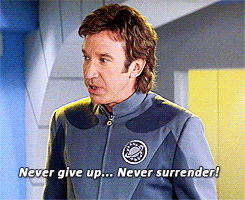Learn to tolerate disappointment
Never give up, never surrender
I overheard a conversation the other day at a coffee shop, between a pair of collaborators where one was clearly having more of an existential crisis than the other -- asking, basically: "When do we give up?" Since I am not a psychopath, I didn't lean over and provide my hot take, but I am going to provide that to you here dear readers, since I think we have a little bit more rapport. The answer? Never!
Now… I don’t know anything about what these people are up to. Maybe they’re actually trying to invent a new version of AI that helps you lie to your date. In which case, they should in fact not do that. But, assuming that this is a conversation about FILMMAKING (the only thing I ever think about), there’s basically only one answer. Don’t give up.
I’ve mentioned this before in the newsletter.
In fact, it’s number 8 on my 10 Things About Screenwriting I Wish I'd Known Sooner. But I think learning to tolerate disappointment deserves its own time here because, facing rejection is probably the number one most common activity for all artists.
The film’s too small.
The film’s too big.
The film is too far along, we like to get involved sooner.
The film isn’t far enough along, we can’t get involved at this early stage.
We aren’t taking on new projects right now.
The cast isn’t famous enough.
You aren’t famous enough.
And, more often than not… No answer at all. Complete radio silence.
These are just some of the creative and fun ways that you might face rejection!
Finding YES is actually the most pernicious problem facing artists, and we don’t talk a lot about how to handle hearing some form of no over and over. It’s not fun! And I think we can often fall into the trap as we find ourselves facing No of thinking that other people must never face rejection, and instead only ever get told “Yes, of course!” I am here to tell you, as someone who has occasionally hear “Yes” that this is not true.
The vast majority of answers are no. There is an expansive, complicated matrix of reasons people might say no, and they are often actively trying to find a reason to say no. It is our job to hear that no, and politely, respectfully, preferably privately mutter to ourselves… Well… fuck them. I’m going to do it anyway.
No is not personal, it’s business. It usually has nothing to do with you, or the project, at all. And instead is often about someone else’s time/energy/wallet. Do not take it personally. Instead, put a little strikethrough through that person’s name on your list of potential producers/directors/funders. You may want to literally shake off the bad vibes with a walk, a run, a glass of water/wine, a brief bitch session with a friend, and then… you should never think about it again.
I am not saying ignore feedback. Feedback is critical. If you hear no from five people for the same exact reason… “We don’t think the ending is satisfying” or “I found myself confused…” That’s something to strongly consider!
Some writers are in it simply to write. And if they hear no a bunch of times on something, they will say “Ok, this one is not working, that’s fine. I will write a new one.” This is a great approach! This has often been my approach!
But… we do not write movies to not someday make them. We write them thinking “Somebody should see this. This must exist.” If that’s your belief, stand firm. Don’t let someone’s disinterest tarnish your opinion.
I was listening to my pals’ podcast The Hollywood Hang (hi Nic! hi Tepper!) and guest Meredith Dawson had great advice — “Go where you’re wanted.”
If you’re feeling a no, it is usually better to not try to convince your way to yes, but instead sense… this is probably not going to be a fit, maybe I should go somewhere else, where we are both excited to say yes! This is great Hollywood advice, and great relationship advice. Because at the end of the day, making a movie with someone is a lot like getting married. You are going to be working together for years, to cocreate something through hard times and happiness, in sickness and in health, and you do not want someone who is already looking for the exit. You want the person who is excited.
So maybe that’s a way to tolerate hearing no. “I have dodged a bullet. This person was clear about what they wanted and did not want, and saved me from potentially getting stuck with them and having a very bad time for a very long time.”
We are looking to make things, to get to play together, and it’s a lot better to do that with people who want to do that, then people who aren’t really sure about this whole… playing together thing.
So shake it off. Rub some dirt on it. And get back out there.




Thanks for this today! My week ended with a few big disappointments and I’m always trying to figure out the best way to cope with them.
There's definitely a balance to know when to keep pushing on and when to "refocus".
Quitting entirely can lead to regret - unless it's absolutely something you want/need to do - but knowing when to take things from another angle is something that should be examined with regularity.